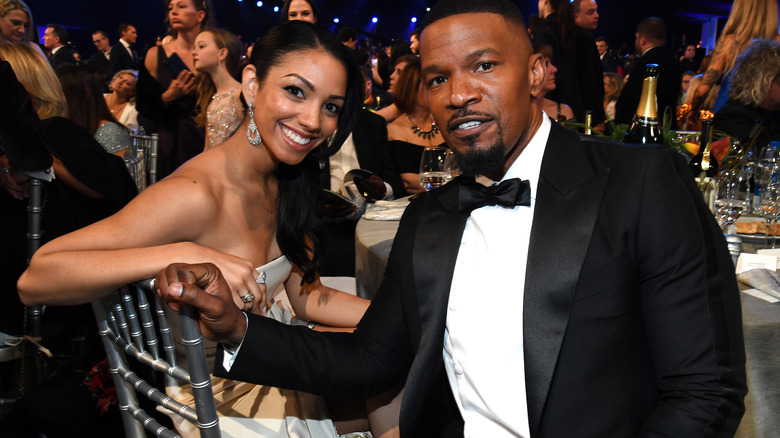The Serious Medical Condition Jamie Foxx's Daughter Corinne Lives With
Corinne Foxx, Jamie Foxx's daughter, is using her star power for good, advocating for an issue that's personal and intimate. She was diagnosed with a reproductive disease called endometriosis and told Essence in February that she experienced "debilitating pain" during her menstrual cycles from ages 13 to 24, finding out afterward that one of her aunts and grandmother lived with it, too. Because of the struggles she faced to get diagnosed and how underreported the disease is, she's working to be an advocate for better healthcare for those suffering from endometriosis, especially a faster way to be diagnosed.
But Foxx wasn't just diagnosed with endometriosis — she was diagnosed with stage IV endometriosis. This disease occurs when uterus-like tissue grows outside of where it's supposed to, attaching to different organs and becoming inflamed. This can cause lesions, cysts, and scar tissue. The four stages of endometriosis dictate how severe the condition is on the individual, with stage I being minimal, II being mild, III being moderate, and IV being severe. By stage IV of endometriosis, "deep implants and dense adhesions are present" in the patient, and it's the most widespread of the stages. The U.S. Department of Health & Human Services Office on Women's Health reported that 11% of women between the ages of 14 to 44 have the disease, and it takes from seven years up to a decade to get a diagnosis.
Corinne Foxx is speaking out about her endometriosis diagnosis
Corinne Foxx went through most of her adolescence and early adulthood dealing with untreated endometriosis. She only realized it was an issue once someone else noted that her pain was abnormal when they found her in the fetal position on the floor. "I had a roommate tell me, 'Corinne, this is not normal,'" Foxx told Today. "That was the moment for me where it just changed the trajectory of my life. And then I went on this journey to start figuring out, 'Well, if it's not normal, then what is it?'"
Foxx is now an ambassador for the Endometriosis Foundation of America and Sollis Health and makes speaking out about endometriosis a big part of her purpose and career. Again, a major problem for those dealing with endometriosis is the diagnosis process. The reason the diagnosis process can take so long for this disease is because of the way medical professionals often dismiss people's reproductive pain and women's pain, in general. This is what happened to Foxx. "It was really a terrifying process and a frustrating process," she said. "There's a lot of medical gaslighting that goes into this journey. I think women of color, especially, are often silenced or not believed when they come in with symptoms." Foxx said she did a lot of her own research before settling on a specialist and the proper surgery for her.
Corinne Foxx helped make a documentary about endometriosis
Through her advocacy work surrounding endometriosis, Corinne Foxx became an executive producer on the documentary "Below the Belt," directed by Shannon Cohn. The movie showcases the lives of four people living with the disease. It works to highlight how much women are "dismissed, discounted, and disbelieved" due to medical bias, the healthcare system, and society at large. Foxx, Cohn, actor Rosario Dawson and others screened the film for members of Congress, which Foxx said is special to gain support from both sides of the aisle. "The goal of the film is education and awareness and also advocacy to get more research dollars for endometriosis so that we can find more affordable treatments, more affordable and effective imaging so you don't have to do a surgery to find out if you have endometriosis," she told Today.
Foxx was also awarded the Blossom Award by the Endometriosis Foundation of America for her work, an award Lena Dunham and Halsey have won before. As for what her father, Jamie Foxx, said when she told him, she shared with Essence that because of the "intimate" nature of the disease, she waited until right before her 2018 surgery to tell him. "When I did tell my dad, of course, he was so supportive," she said. "He was holding my hand right as I went off to surgery. Both my parents and my entire family have been instrumental in my healing."



